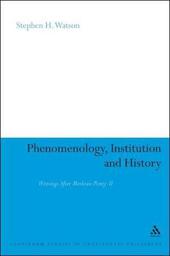
|
Phenomenology, Institution and History: Writings After Merleau-Ponty II
Paperback / softback
Main Details
| Title |
Phenomenology, Institution and History: Writings After Merleau-Ponty II
|
| Authors and Contributors |
By (author) Professor Stephen H. Watson
|
| Series | Continuum Studies in Continental Philosophy |
|---|
| Physical Properties |
| Format:Paperback / softback | | Pages:208 | | Dimensions(mm): Height 234,Width 156 |
|
| Category/Genre | Phenomenology and Existentialism |
|---|
| ISBN/Barcode |
9781441158970
|
| Classifications | Dewey:142.7 |
|---|
| Audience | | Professional & Vocational | |
|---|
| Edition |
NIPPOD
|
|
Publishing Details |
| Publisher |
Continuum Publishing Corporation
|
| Imprint |
Continuum Publishing Corporation
|
| Publication Date |
5 January 2012 |
| Publication Country |
United States
|
Description
Maurice Merleau-Ponty is widely known for his emphasis on embodied perceptual experience. This emphasis initially relied heavily on the positive results of Gestalt psychology in addressing issues in philosophical psychology and philosophy of mind from a phenomenological standpoint. However, far less work has been done in addressing his evolving conception of how such an account influenced more general philosophical issues in epistemology, accounts of rationality, or its status of theoretical discourse. Developing the work he has already done in In the Shadow of Phenomenology to address this gap in the literature, Stephen H. Watson further examines the responses to Merleau-Ponty's contributions to these issues. This book emphasises the historical and intersubjective underpinnings of Merleau-Ponty's late accounts, in relation to rationality, institution and community, and examines its implications.
Author Biography
Stephen H. Watson is Professor of Philosophy at the University of Notre Dame, USA. His previous publications include Traditions I (Indiana University Press, 1997), Traditions II (Indiana University Press, 2001) and Reinterpreting the Political (SUNY Press, 1998).
Reviews"Watson interprets some of French phenomenologist Maurice Merleau-Ponty's (1908-61) controversial late arguments by tracing the complex relations that form their antecedents within the history and development of phenomenology. He covers from the ethics of ambiguity to the dialectics of virtue; the long farewell to subject-centered rationality; theoretical crisis, dialogue, and the stoicism of the transcendental singular; notes of Bachelard and Merleau-Ponty falling between phenomenology and poetics; the question of community in Lefort; and beyond the antinomies of expression in writing after Merleau-Ponty." - Eithne O'Leyne, BOOK NEWS, Inc.
|